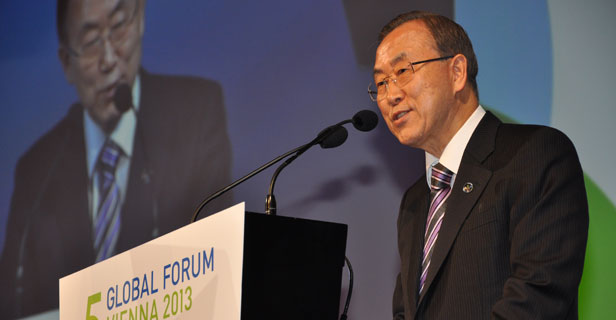
Top United Nations officials today urged world leaders to promote tolerance and respect, adding that these principles can contribute to resolving conflicts, such as those in Syria and Mali, as well as addressing a host of other global challenges.
"Durable solutions need long-term mutual understanding that transcends religious, national, cultural and ethnic boundaries. Such understanding comes from responsible leadership - the theme of this forum," Secretary-General Ban Ki-moon said in his remarks to the opening of the Fifth Global Forum of the UN Alliance of Civilizations in Vienna.
"From the world stage to local communities, leaders need to speak the language of tolerance and respect, not division and defamation," he added. "Wherever tensions divide communities, the opportunity exists for the Alliance to build bridges and to help people move from conflict to collaboration."
Launched in 2005 through the initiative of Spain and Turkey, and under the auspices of the UN, the Alliance seeks to promote better cross-cultural relations worldwide. The theme for this year's forum, which comprises decision-makers, experts, and a variety of stakeholders in the field of intercultural and interreligious dialogue, is 'Responsible Leadership in Diversity and Dialogue'.
Nassir Abdulaziz Al-Nasser, the incoming UN High Representative for the Alliance of Civilizations, said he believed responsible leadership can create the necessary social cohesion, where every man and woman feel included.
"I believe that the Alliance can enhance international cooperation and contribute to the efforts of the United Nations to address the challenges facing humanity today, particularly when they are rooted in identity and cultural underpinnings," he stated.
Mr. Ban also said that Israelis and Palestinians remain polarized, while movement in the Middle East peace process is "overdue". He added that he was particularly concerned about the region's youth, who are at risk of growing up with a "demonized, dehumanized - and utterly false - concept of their neighbours".
He urged the Alliance to support peacemakers on both sides, such as Aziz Abu Sarah. A Palestinian whose brother was killed, Mr. Sarah leads tours of the conflict areas that show both sides of the conflict and plans to expand to Egypt and Jordan, with the Alliance's support.
Addressing the youth event at the Fifth Global Forum of the UN Alliance of Civilizations the Secretary-General called on the world's youth to take the helm in steering the international community through its turbulent period of economic and political transition and towards a more "prosperous, equitable and peaceful future".
"I am here today to ask you to help show us the way. The world is going through a period of transition - economic, demographic, political and environmental," Mr. Ban said in his remarks, stating that although the challenges are profound, "so are the opportunities."
Mr. Ban underscored the UN agenda for "deepening" its youth focus in programmes related to employment and entrepreneurship, political inclusion and human rights, and education and reproductive health, noting that the world body's "top priority" was to work with young people "to enhance your lives, the well-being of your communities, and the state of the world."
Another event during the 5 th Global Forum was the Alliance's Intercultural Innovation Award Ceremony, organized by the BMW Group. Noting the work of the ten finalists, Mr. Ban said: "The creative solutions being showcased tonight hold lessons for all communities and for organizations such as the United Nations."
The first place winner, Puerta Joven of Mexico, received a $50,000 prize for 'Lenguas Jóvenes' or Languages of Youth, which brings together indigenous youth groups who are discriminated because of their cultural identity or language.
One of the finalists was from Hungary. IDResearch Kft have developed Immigropoly, a unique Internet-based character-game to increase the understanding of migration and integration in our global world, and targeted towards youth communities.
While in Vienna, the Secretary-General also held a series of bilateral meetings with visiting dignitaries, including the Emir of Qatar, the Spanish Foreign Minister and the Turkish Prime Minister.
He met with Austrian President Heinz Fischer and with Austrian Foreign Minister Michael Spindelegger. During their meetings they discussed the crises in Syria and Mali and the Secretary-General expressed his gratitude for Austria's contribution to the UN, notably to its peacekeeping operations, including in the Middle East and for hosting the Fifth Global forum of the Alliance of Civilizations.